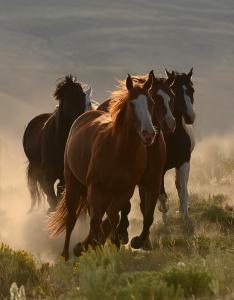
A New Perspective on America’s Wild Horses for Our Habitats and Humanity
In a critical time for America’s wild horses, why not foster a nonpartisan solution that allows them to stimulate biodiversity and socio-economic benefits?
NEW YORK, UNITED STATES, May 17, 2019 /EINPresswire.com/ -- With all of the controversy surrounding America’s wild horses, including management, sterilization, slaughter and more; the conversation is undoubtedly riddled with frustration from both The Bureau of Land Management, the agency that oversees the management of their population, and the advocates working to protect them. Because no matter where you stand, the fact is that over 60,000 wild horses currently stand warehoused in taxpayer funded holding facilities; costing over $100 million a year and rising. But what's not being discussed on either side of the aisle is a common sense solution that would allow wild horses to fulfill their ecological and spiritual niche, while saving millions of taxpayer dollars spent on up-keeping wild horses in captivity. One that could increase workforce opportunities and accrue socio-economic benefits to the local communities who welcome these wild horses. This solution is called rewilding.
Rewilding is the reintroduction of select plants and animals into an environment to help restore an ecological balance that benefits all inhabitants. Rewilding with wild horses is a popular strategy in Europe including the Netherlands, Switzerland, Poland, Romania, Bulgaria, Spain and more. There is a crucial thread of connection between America’s wild horses and habitats, as well as to our humanity; therefore highlighting rewilding as a sensible management strategy for these populations here in the States. Rewilding with America’s wild horses would begin by shifting our nation's current narrative of wild horses as a nuisance and instead as a valued and integral component to our American ecosystems. By understanding their value for our habitat and land conservation with the overall impact that has on our future, we can restore an ecological balance to our environment through their presence. Thousands of case studies around the world prove wild horses have a unique ability to provide balance to our ecosystems and to our spirits.
Worldwide ecological studies show that wild horses have an adaptive instinct to harmoniously fit into a variety of ecosystems, which they enhance. As large herbivores, their grazing and digesting of foliage is beneficial, because their fecal matter holds seeds intact. Their walking patterns and tails disperse seeds from other plants while their flat hooves plant them; thus helping to sustain the surrounding ecosystem. As a keystone species to North America, when wild horses are allowed to fulfill their ancient ecological niche they restore balance to our precious, yet degrading ecosystems. This biodiversity and the habitats that support it, provides everything that humans depend on for our survival. Why not allow wild horses to naturally stimulate biodiversity and as a result, a greater resilience to environmental factors affecting survival and ecosystem stability, including climate change, here in America as others are doing globally?
“Rewilding can humanely manage and preserve America’s wild horse populations while ensuring they live with dignity in a protected habitat; free from the risk of slaughter and out of Bureau of Land Management facilities,” said Manda Kalimian, Founder of CANA Foundation, a rewilding organization. “In doing so, we can help to foster conservation and sustainability for the lands the horses live on; contributing to the preservation of our global biodiversity and the mitigation of wildfires and climate breakdown.”
Additionally, wild horses have a unique ability to heal and enrich the human spirit; which has been proven through their presence in various rehabilitation and therapy programs. Rewilding can incorporate wild horses as part of these and other social, environmental, economical and ecotourism projects that provide benefits to the communities who welcome them. And when done in on tribal nations, rewilding with wild horses empowers those with the knowledge and understanding of natural law and the original creation to become rightful stewards once again. Workforce opportunities go hand in hand with the presence of wild horses; from their humane management to veterinary and research opportunities, fence building and other site jobs.
Rewilding creates a solution to our nation’s current wild horse crisis, which has puts the lives of thousands of wild horses at risk if slaughter is legalized as a management tool. “The present-day mismanagement of our horses is old and antiquated and has created an environmental, fiscal, and potential health crisis for the American people. Rewilding is the way of the future; a multifaceted and nonpartisan solution that helps find a balance between wild horses, taxpayers and habitats,” said former Congressman Steve Israel.
Creating a synergistic approach to rewilding can no doubt be the safest, most efficient, cost-saving way to create sustainable horse herds; therefore creating sustainable communities through projects that provide revenues and benefits to their local economies. This approach would save millions to the American taxpayer by reducing the need to maintain wild horses in captivity. Rewilding will also reconnect humans with the natural world we are a part of and empower us to revive the important role as stewards of our land. For all human, plants and animals who call our America home, this rewilding, restoration and preservation is more important now, than ever.
Danielle DeVincentis
CANA Foundation
+1 631-258-0971
email us here
Visit us on social media:
Facebook
Twitter
EIN Presswire does not exercise editorial control over third-party content provided, uploaded, published, or distributed by users of EIN Presswire. We are a distributor, not a publisher, of 3rd party content. Such content may contain the views, opinions, statements, offers, and other material of the respective users, suppliers, participants, or authors.


